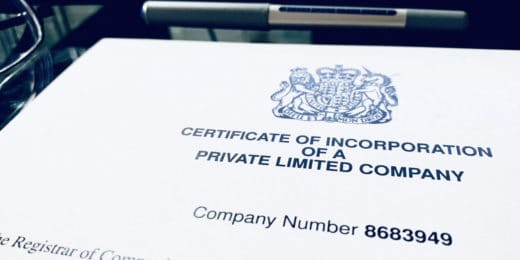Despite the word ‘company’, you may be surprised and pleased to learn that you can set up a UK limited company on your own, without the need for anyone else’s involvement. This is provided that you choose the correct type of limited company.
In this article, we look at the different limited company structures that are available to you if you want to set up alone.
Limited companies and the number of people they require
In the UK, there are several types of limited company. These are the main ones, alongside the minimum number of people you will need to register the company with Companies House and then operate it compliantly:
- Private companies limited by shares: one person
- Private companies limited by guarantee: one person
- Public limited companies: two people
Most companies registered in the UK are private companies limited by shares. If you wish to set up a limited company and intend to make a profit, this is likely to be the most suitable type of limited company for you.
Private companies limited by guarantee are generally used for non-profit purposes, such as charitable work.
Public limited companies allow owners to offer shares to the public, but cannot trade until a minimum of £12,500 of the share value has been paid up. They must also have a share capital of at least £50,000 in nominal value.
Other company types and the number of people they require
Whilst we’re focusing on limited companies, we should also mention two other incorporated entities (meaning that they need to be registered with Companies House) that don’t fall under the limited company description:
- Private unlimited companies: one person
- Limited liability partnerships: two people
Private unlimited companies are a rare type of company whereby the owners do not benefit from the limited liability that other company types enjoy. However, they do have the advantage of not having to publicly disclose as much financial information as a private company limited by shares.
Limited liability partnerships are typically formed by professionals such as accountants, solicitors and dentists, where each partner’s liabilities are limited to the amount they put into the business.
About sole traders
As the name would suggest, sole traders are another form of business that can be set up by just one person. However, sole traders are not a type of company and are a wholly different business structure.
Because sole traders are not companies, registration with Companies House is not necessary. Instead, to set up as a sole trader, you must register for Self Assessment with HMRC.
In the UK, when someone is going into business by themselves, they generally choose to run as either a sole trader or a private company limited by shares. It’s not always a simple choice, as there are advantages and disadvantages to both structures.
For example, a sole trader is not provided with the financial protection that the owners of a private company limited by shares have. Despite this, they are relatively easy to run, with minimal administration involved.
Comparatively, someone running a private company limited by shares is afforded financial protection through limited liability. However, they require a level of administration to ensure they remain compliant with stringent company laws.
For more examples of the advantages and disadvantages of both structures, see this article below: Sole trader or limited company?
Officers and members of the limited company
If you plan to set up a limited company on your own, you will need to be the sole officer and owner of the company.
The officers are directors, people with significant control (PSCs) and secretaries (these are now optional appointments). One person can be all of these.
- Director: the person who is responsible for the general running of the company
- PSC: the person who holds ultimate control of the company
- Secretary (if you choose to appoint one): the person responsible for the company’s administrative tasks
The owner of the company is always known as a member, but can also be referred to as a shareholder or guarantor, depending on the company type.
Private company limited by shares:
To set the company up alone you will need to be the:
- Director
- The person with significant control
- Shareholder/member
Private company limited by guarantee:
To set the company up alone, you will need to be the:
- Director
- The person with significant control
- Guarantor/member
Private unlimited company:
To set the company up alone you will need to be the:
- Director
- The person with significant control
- Shareholder/member, if the company has a share capital; or
- Guarantor/member, if the company does not have a share capital
Each of these limited company types can also be formed by multiple people taking on these different ‘roles’.
The articles of association
A company’s article of association (a document that regulates how the company is going to operate) may stipulate that a company must have more than one person within it.
However, this would be a self-imposed provision and so not a concern for anyone who wanted to set up a private company limited by shares, a private company limited by guarantee, or a private unlimited company by themselves.
So there you have it
Can you set up a limited company on your own? Absolutely, provided that you register one of the companies highlighted in this blog.
So, are you ready to start your own limited company? Whether you want to start a company on your own, or have business partners in place, we can help from as little as £2.99. See the below link for more information:
Rapid Formations company formation packages
We hope you have found this blog helpful. Please leave a comment if you have any questions. Thanks for reading.
Please note that the information provided in this article is for general informational purposes only and does not constitute legal, tax, or professional advice. While our aim is that the content is accurate and up to date, it should not be relied upon as a substitute for tailored advice from qualified professionals. We strongly recommend that you seek independent legal and tax advice specific to your circumstances before acting on any information contained in this article. We accept no responsibility or liability for any loss or damage that may result from your reliance on the information provided in this article. Use of the information contained in this article is entirely at your own risk.












Join The Discussion
Comments (2)
Very interesting read!
Thank you for your kind comment, Amelia. We’re glad you enjoyed it.
Kind regards,
The Rapid Formations Team